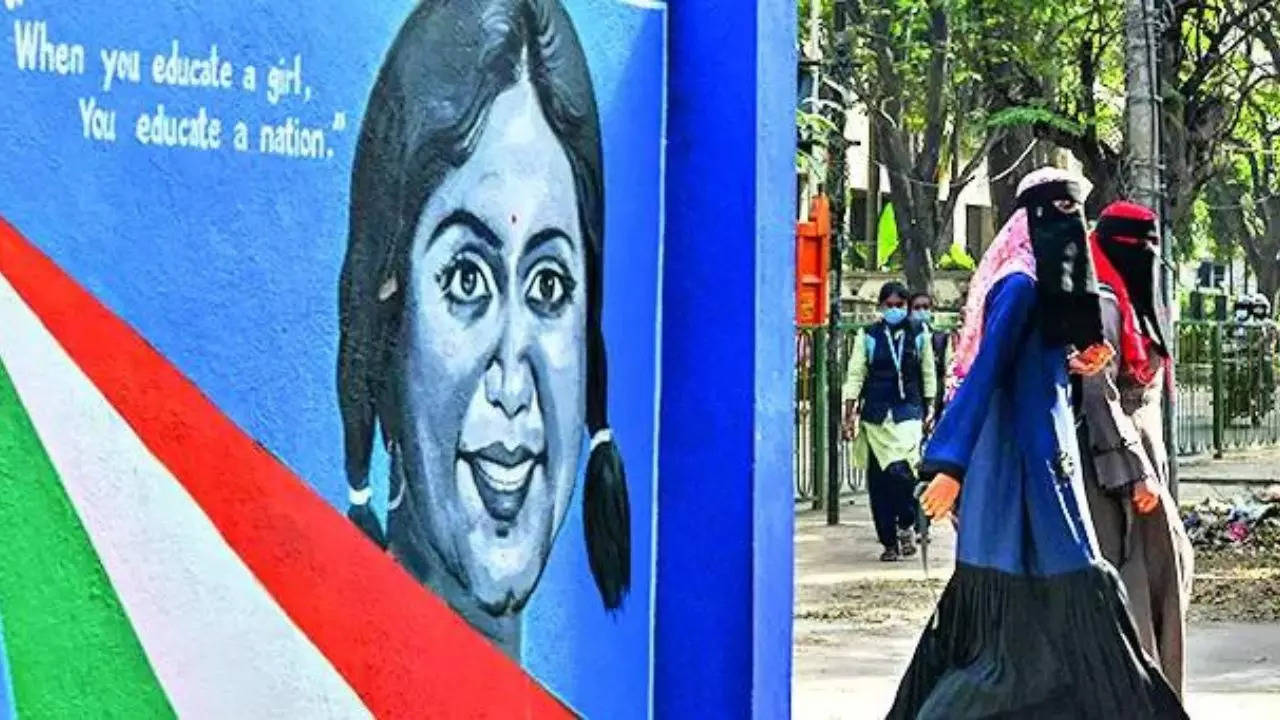MUMBAI: Observing that it is in the larger academic interest of students, Bombay high court on Wednesday upheld the ban by a Chembur college on students wearing burqa, hijab and niqab on the campus as part of its dress code.
“The object behind prescribing the dress code is evident from the instructions since they state that the intention is that a student’s religion ought not to be revealed.It is in the larger academic interest of the students as well as for the administration and discipline of the college that this object is achieved,” said Justices A S Chandurkar and Rajesh Patil.
They dismissed a petition by nine SY/TY science students of N G Acharya and D K Marathe College that the ban is arbitrary and discriminatory and affects their fundamental rights to expression under Article 19 (1) (a) and religion under Article 25. Their rights to choice and privacy were affected by the dress code and donning hijab and niqab was an essential religious practice.
Senior advocate Anil Anturkar, for the college, had cited Karnataka HC full bench’s judgment in a similar case that donning hijab or niqab was not an essential practice of girls professing Islam and prescribing dress code did not violate their fundamental rights. A challenge is pending in the Supreme Court. “ We are in respectful agreement with the full bench that the prescription of dress code is intended to achieve uniformity amongst students in the school/college so as to maintain discipline and avoid disclosure of religion,” the judges said.
They also said the college’s right to maintain discipline flows from recognised fundamental right to establish and administer an educational institution. “We do not find how the prescription of the dress code by the college violates the provision of Article 19 (1) (a) and Article 25,” they said, adding “moreover a changing room was provided.”
They noted that college’s instructions “are applicable to all students irrespective of caste, creed, religion or language.” The students’ advocate Altaf Khan argued the dress code is against University Grants Commission regulations, Rashtriya Uchhastar Shiksha Abhiyan and National Education Policy. The judges said “above guidelines and instructions attempt to promote a non-discriminatory atmosphere in higher educational institutions” and “we do not find how” they are violated by the college’s instructions.
The judges also said “there is no material placed to uphold the petitioners’ contention that donning of a hijab and niqab is essential religious practice.” “For the aforesaid reasons, we are satisfied that the instructions issued by the college under which a dress code has been prescribed for its students does not suffer from any infirmity so as to violate provision of Article 19(1)(a) and Article 25…,” they concluded.
“The object behind prescribing the dress code is evident from the instructions since they state that the intention is that a student’s religion ought not to be revealed.It is in the larger academic interest of the students as well as for the administration and discipline of the college that this object is achieved,” said Justices A S Chandurkar and Rajesh Patil.
They dismissed a petition by nine SY/TY science students of N G Acharya and D K Marathe College that the ban is arbitrary and discriminatory and affects their fundamental rights to expression under Article 19 (1) (a) and religion under Article 25. Their rights to choice and privacy were affected by the dress code and donning hijab and niqab was an essential religious practice.
Senior advocate Anil Anturkar, for the college, had cited Karnataka HC full bench’s judgment in a similar case that donning hijab or niqab was not an essential practice of girls professing Islam and prescribing dress code did not violate their fundamental rights. A challenge is pending in the Supreme Court. “ We are in respectful agreement with the full bench that the prescription of dress code is intended to achieve uniformity amongst students in the school/college so as to maintain discipline and avoid disclosure of religion,” the judges said.
They also said the college’s right to maintain discipline flows from recognised fundamental right to establish and administer an educational institution. “We do not find how the prescription of the dress code by the college violates the provision of Article 19 (1) (a) and Article 25,” they said, adding “moreover a changing room was provided.”
They noted that college’s instructions “are applicable to all students irrespective of caste, creed, religion or language.” The students’ advocate Altaf Khan argued the dress code is against University Grants Commission regulations, Rashtriya Uchhastar Shiksha Abhiyan and National Education Policy. The judges said “above guidelines and instructions attempt to promote a non-discriminatory atmosphere in higher educational institutions” and “we do not find how” they are violated by the college’s instructions.
The judges also said “there is no material placed to uphold the petitioners’ contention that donning of a hijab and niqab is essential religious practice.” “For the aforesaid reasons, we are satisfied that the instructions issued by the college under which a dress code has been prescribed for its students does not suffer from any infirmity so as to violate provision of Article 19(1)(a) and Article 25…,” they concluded.
